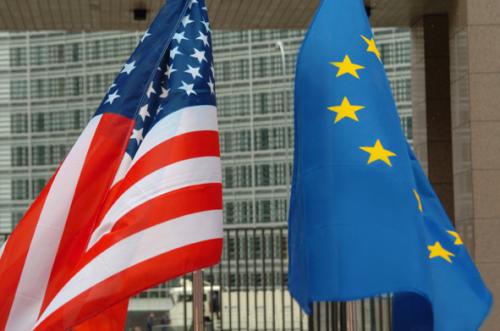At a time when the United States and all its allies are looking at years of reduced resources for all kinds of discretionary government spending, including defense, American interest and faith in the transatlantic alliance seems to be fading fast. Is this a sign of permanent decline in the sense of “Atlantic community,” or is it a temporary blip on the Euro-Atlantic radar screen, perhaps a case of Euro-fatigue?
For his part, President Obama is now four years distanced from the heady days of European acclaim and even infatuation with the presidential candidate who promised not to be Bush. Candidate Obama responded to cheering throngs in Berlin in July 2008 by proclaiming “America has no better partner than Europe.” While Obama is still favored by public opinion in virtually all European countries over the Republican aspirant, Mitt Romney, that no longer seems to make such a big difference in the Obama White House.
Perhaps it is not surprising that the bloom has gone off the rose in Obama’s ties to Europe. After all, his administration has had to contend with the frustrating caveats some European allies placed on the use of their forces in Afghanistan. European allies provided critically important forces to the Afghan campaign, but US management of NATO’s International Security Assistance Force presented a constant set of diplomatic and military challenges.
The administration’s “pivot toward Asia,” combined with further reductions of the military presence in Europe, while perhaps not intended as a zero-sum game for transatlantic relations, nonetheless left the impression that Europe’s importance was diminishing in Washington’s current eyes. As if to reinforce the point, the Pentagon is in the process of closing down the Center for Transatlantic Security Studies at the National Defense University – saving little money but perhaps sending a message.
Now, when the president hopes that a reviving economy will help carry him into a second term, Europe’s financial crises are blamed for uncertainty on the stock markets, slow growth projections, and a still-depressed American job market. Obama’s re-election campaign could be forgiven for hoping that American voters will put part of the blame for American economic weakness on the Europeans and their troubled Euro.
On the other side of the American political divide, while candidate Romney blames the Obama administration for weakening US alliances, his campaign shows little inclination to give US-European relations a high priority. This is no surprise. Many Republicans see the Europeans and our alliance with them, NATO, as “worthless,” as one soon-to-be top advisor to Secretary of Defense Rumsfeld described them to me in 2000. This dismissive attitude toward our European allies among Republican defense and foreign policy experts is seldom expressed in public, but rests just beneath the surface. Once in a while, it shows through, as it did in September 2001 when Rumsfeld informed the world that the administration would not rely on NATO in response to the 9/11 attacks.
On social and economic issues, even conservative European political parties are uncomfortable with the domestic philosophies that guide Romney and his Republican supporters. That reality has for years made American Republicans suspicious of all European political parties, even those on the right. Republican assertions that Obama’s policies resemble “European style socialism” certainly don’t lead to warm and fuzzy feelings across the Atlantic. Now the Romney-Ryan team pledges that “we cannot become Europe,” seeming to condemn everything European before cheering Republican audiences.
Taken together, this could be interpreted as the beginning of the end for the transatlantic alliance. One European expert has already proclaimed the state of affairs as “the end of the West as a political community.” The European perception of declining American interest and involvement in European affairs combined with American Euro-fatigue may already be creating a downward cycle in the vitality of the relationship.
Such conclusions may be warranted, and should at a minimum be seen as a warning to those who believe that the transatlantic relationship remains critically important to the national interests of the United States, Canada, and the European allies.
The continuing drag on the US economy resulting from Europe’s financial difficulties illustrates all too well the inescapable mutual interdependence in today’s international economy. And, the fact that the 2008 American financial crisis helped stimulate Europe’s current difficulties makes it clear that it is a two-way street.
Ignoring the importance of developing even closer transatlantic cooperation on all fronts would be perilous for both American and European interests. The most vital American security interest and responsibility of the national government is defense of the homeland and protection of its citizens. An active alliance with America’s leading partners addresses that vital interest in very many ways. Ironically, American interests and influence in the Pacific region, supposedly the target of the current pivot toward Asia, would be weakened should the foundation of American power in the transatlantic area begin to crumble. Asian leaders will be watching to see whether the America that is engaged in their region is backed up by solid transatlantic ties.
On the practical level, NATO does not have to be engaged in a major conflict, as it has been in Afghanistan, to be valuable. The day-to-day political and military cooperation in alliance forums still validates the collective defense pledge to assist another ally if it is attacked, and provides options for responses to less demanding security challenges when they arise. Alliance cooperation is even more valuable at a time of reduced resources available for defense. That reality should inform leaders of both American political parties.
Stanley R. Sloan is director of the Atlantic Community Initiative, a consultant to the National Defense University’s Center for Transatlantic Security Studies, and a visiting scholar at Vermont’s Middlebury College. His most recent book is Permanent Alliance? NATO and the Transatlantic Bargain from Truman to Obama (2010).
Image: US_Europe.jpg
